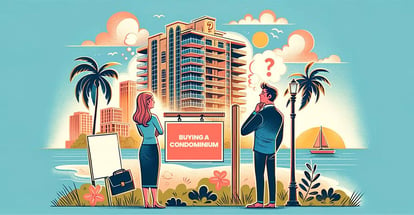Read This Before Buying a Florida Condo: Insights From Condo Owners
Hi Phil and Ryan,
I've recently set my sights on purchasing a condo in Florida as my next big step in life. However, the more I delve into what's required, the more overwhelmed I feel.
From understanding how condos are managed and what to expect from homeowner associations to navigating through the maze of financial considerations and loan options such as FHA, VA, or conventional loans, it all seems like a lot.
Can you help me make sense of all this so I can confidently buy my Florida condo?
Jose Y.
Expert Answer: Hi Jose, let's fill you in on everything you need to know before you finance a condo in Florida.
Things You NEED to Check Before Buying a Florida Condo
When diving into the world of Florida condos, hindsight from current condo owners can be your foresight.
Here's a distilled list of essential checks before you make your purchase, as shared by condo owners themselves:
Construction Quality and Soundproofing
-
Inspect the Build Quality: Are the walls and floors thin? Will you hear every step and whisper from your neighbors?
- Flooring Regulations: Are there rules about having hardwood floors or requirements for softer, noise-dampening materials?
HOA and Management
-
Understanding the HOA: How well is it run? Is management outsourced, or do owners have a say? Dive into the reserves, maintenance plans, and any upcoming big-ticket items.
- Meeting Minutes and Budgets: Review recent meeting minutes and budgets for red flags. Consider a professional opinion on the financial health of the HOA.
Investment Considerations
-
Rental Policies: Can the unit be rented out? If so, are there restrictions on duration or platforms like Airbnb?
- Owner vs. Renter Ratio: How does the mix of owners and renters affect the community and potential investment returns?
Living Conditions and Policies
-
Soundproofing: Prioritize your peace and quiet by understanding the level of sound insulation between units.
-
Top Floor Preference: To avoid overhead noise, consider units on the top floor.
-
Parking Situation: How many spots do you get, and are they deeded or assigned?
-
Community Problems: What are the current issues or complaints within the community?
- Pet and Rental Restrictions: Understand the rules around pets and renting your unit.
Legal and Financial Health
-
Pending Litigations: Are there any legal battles involving the HOA?
-
History of HOA Fee Increases: Look at past increases to gauge potential future costs.
- Major Upcoming Projects: Are there any known upcoming projects that might affect your dues or require special assessments?
Amenities and Utilities
-
Common Facilities: Evaluate the condition and maintenance of amenities like pools and gyms.
- Utilities: Are they individually metered or shared? This can impact your monthly expenses.
Long-Term Considerations
-
Future Family Plans: If you plan to grow your family, consider space needs before settling on a studio or one-bedroom.
- HOA Fee Inclusions: What does your HOA fee cover? Are there separate fees for utilities or amenities?
Additional Insights
-
Neighbor Research: Understand who your neighbors are, especially if you share walls or floors.
-
Special Assessments: Inquire about past and potential future special assessments for big repairs or upgrades.
- HOA Rental Policy: Ensure you know the rules if you plan to rent your condo in the future.

Using FHA and VA Loans to Buy a Florida Condo
To use FHA and VA loans for purchasing a condo in Florida, it's essential to grasp the specifics of each loan type based on the eligibility criteria provided.
FHA Loans for Buying a Condo
For FHA loans, the condo project must include at least two units with a significant portion being owner-occupied.
The restrictions also cap FHA loans to no more than 50% of the units and limit commercial use within the project to under half of the total space.
The financial health of the Homeowners Association (HOA) is crucial; it must be free from bankruptcy, foreclosure, or deed-in-lieu actions for the past three years, maintain no more than 15% fee delinquency, and keep 10% of aggregate monthly assessments in reserves.
Additionally, the absence of ongoing litigation related to safety, structural habitability, or functional use is a prerequisite for eligibility.
The HOA should have assumed control within a specified period after the majority of the units were sold or the project was completed.
VA Loans for Buying a Condo
For condos to be eligible for VA loans, they must first be approved by the VA.
The regulations for VA loans are stringent about the percentage of commercial space allowed and restrict the ownership concentration to prevent a single entity from owning too many units.
Newer projects seeking VA loan eligibility must have a significant portion of units presold.
The VA also examines the condo project's governing documents to ensure they meet specific standards related to owner rights and operational aspects.
Utilizing FHA and VA loans offers significant advantages, like lower down payments for FHA loans and no down payment requirements for VA loans.
Using a Conventional Loan to Buy a Florida Condo
For homebuyers interested in purchasing a Florida condo with a conventional loan, it's vital to understand that these loans are governed by standards that emphasize the financial stability and structure of the condo development.
Conventional loans favor projects where a majority of the units are owner-occupied, reflecting a stable community.
They also scrutinize the condo association management, particularly looking at the adequacy of reserves for maintenance and emergency repairs, which speaks to the financial health of the association.
Another critical aspect is the project's adherence to specific building standards and restrictions on the percentage of commercial space allowed, ensuring the primary use is residential.
For buyers, selecting a condo that meets these criteria not only facilitates financing but also signals a sound investment.
Understanding these elements and choosing a condo that aligns with them can streamline the financing process and enhance the property's value over time.
What Are Florida's Condo Ownership Requirements?
When considering buying a condo in Florida (or anywhere, really), here's a straightforward list of essentials:
-
Understand What a Condo Is: Know that you own your unit and share the rest of the property with your neighbors.
-
Review the Costs: Be ready for HOA fees on top of your mortgage, taxes, and insurance.
-
Maintenance is Covered: The HOA handles external repairs and upkeep, making it less work for you.
-
Condo vs. Other Homes: Condos can be more affordable than single-family homes and offer amenities like pools and gyms, but you'll have neighbors close by.
-
Check if a Condo Fits Your Lifestyle: Ideal for singles, couples, or small families who enjoy community living and the convenience of having maintenance handled for them.
-
Shopping Tips: Work with a realtor familiar with condos, research the HOA and its fees, understand the amenities and rules, and consider the property’s value over time.
-
Condo Insurance is a Must: Protects the inside of your unit and your belongings; typically required by lenders.
-
Financing Your Condo: Mortgages for condos might have different requirements, like a larger down payment for a second home or investment property.
-
Types of Mortgages: Explore conventional, FHA, VA, and USDA loans, each with its own set of requirements.
- Avoid Common Mistakes: Research the condo association, the real estate market, and the community to ensure it meets your needs.
Bottom Line
The journey to buying a condo in Florida can seem daunting, but armed with the right knowledge and checks, you can navigate this path with confidence.
Whether you're considering the structure and management of the condo, understanding the intricacies of homeowner associations (HOA), or figuring out the financials and loan options like FHA, VA, or conventional loans, it's crucial to dive deep into these aspects.
Each loan type has its specific criteria, especially regarding the project's eligibility, financial stability, and owner-occupancy rates, which can significantly impact your buying decision.
Remember, buying a condo is not just about finding the right place; it's about ensuring it fits your lifestyle, financial plans, and long-term goals.
With over 50 years of mortgage industry experience, we are here to help you achieve the American dream of owning a home. We strive to provide the best education before, during, and after you buy a home. Our advice is based on experience with Phil Ganz and Team closing over One billion dollars and helping countless families.

About Author - Phil Ganz
Phil Ganz has over 20+ years of experience in the residential financing space. With over a billion dollars of funded loans, Phil helps homebuyers configure the perfect mortgage plan. Whether it's your first home, a complex multiple-property purchase, or anything in between, Phil has the experience to help you achieve your goals.


 By
By  Edited by
Edited by 






